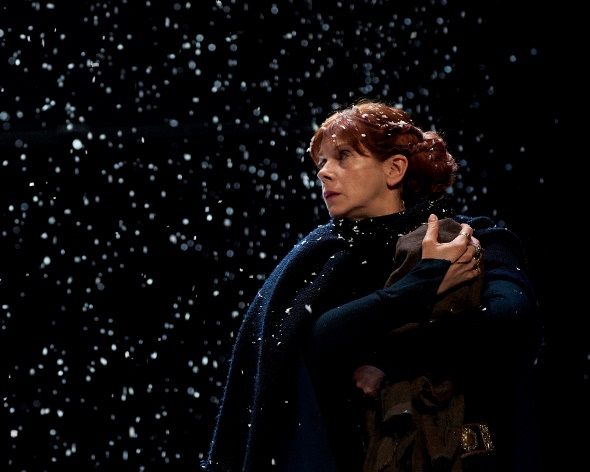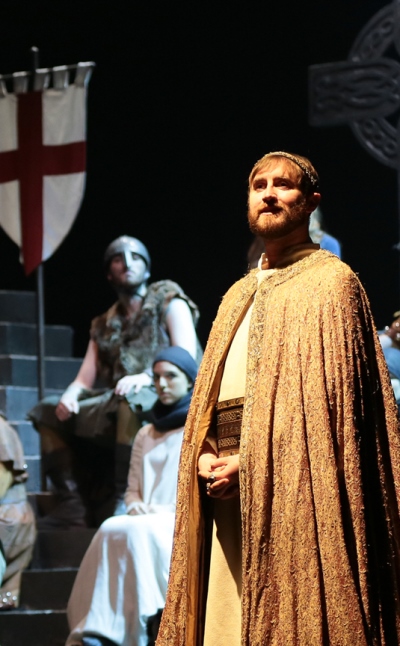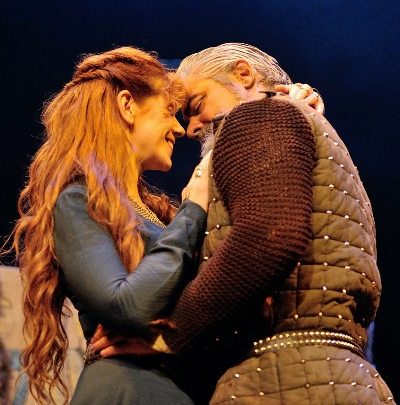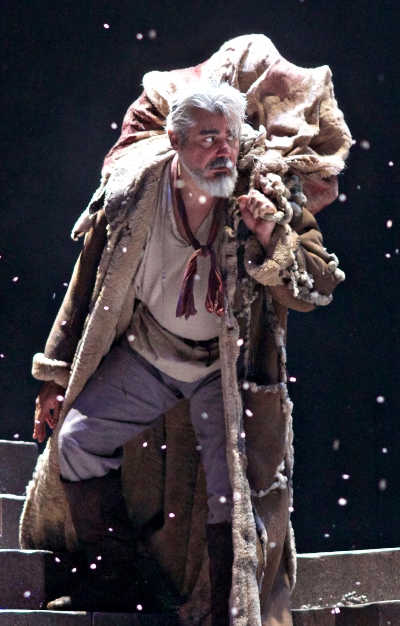Am I sleepwalking, or is that Lady Macbeth? Scottish troupe brings sequel, and it’s a doozy
 Review: “Dunsinane” by David Greig, presented by the Natonal Theatre of Scotland and the Royal Shakespeare Company at Chicago Shakespeare Theater, through March 22. ★★★★★
Review: “Dunsinane” by David Greig, presented by the Natonal Theatre of Scotland and the Royal Shakespeare Company at Chicago Shakespeare Theater, through March 22. ★★★★★
By Lawrence B. Johnson
Surprise! Lady Macbeth didn’t die, after all. And how lucky for us that Scottish playwright David Greig decided to revive Macbeth’s formidable spouse, who now even has a name: Gruach. This very grand dame is the gravitational force of Greig’s “Dunsinane,” a thriller of a play brought to rugged, abundant life by the National Theatre of Scotland at Chicago Shakespeare Theater.
 “Dunsinane,” named after Macbeth’s high castle, opens with the decisive battle of Shakespeare’s play, as a vast English army — concealed by branches stripped from Birnam Wood – overwhelms the fortress and establishes Malcolm, son of the murdered King Duncan, as rightful monarch. Ah, but rightful according to whom? Not the still-breathing, one might even say fire-breathing, widow of Macbeth. Gruach has a son, and he, she declares, is the only legitimate heir to the throne of Scotland.
“Dunsinane,” named after Macbeth’s high castle, opens with the decisive battle of Shakespeare’s play, as a vast English army — concealed by branches stripped from Birnam Wood – overwhelms the fortress and establishes Malcolm, son of the murdered King Duncan, as rightful monarch. Ah, but rightful according to whom? Not the still-breathing, one might even say fire-breathing, widow of Macbeth. Gruach has a son, and he, she declares, is the only legitimate heir to the throne of Scotland.
Thereby hangs a cleverly spun tale of political intrigue and culture clash, peppered with allusions to “King Lear” and “Antony and Cleopatra” and smacking sharply of today’s American-led military presence in the Middle East. Despite its medieval setting, this grandly designed and lavishly costumed production directed by Roxana Silbert rings of a world we know only too well.
To a war-tested old general like Siward, Earl of Northumberland (Darrell D’Silva), the task at hand looks clear and manageable: Go into Scotland with a large force and secure the throne for Malcolm, thereby also securing peace along England’s northern border. With the local help of the aggrieved Macduff (Keith Fleming), himself a capable and respected soldier, subduing the scattered Scottish opposition should present little problem.
 What both Siward and Macduff have failed to take into account is Gruach (Siobhan Redmond), the wily and resolute Lady Macbeth, whose network of supporters is extensive, devoted and invisible. It will be a contest between Siward’s conventional means to supremacy and the elusive methods of his prisoner Gruach, unarmed but also disarming. Hovering on the political periphery, as would-be king and wry observer is Malcolm (Ewan Donald), who constantly reminds Siward that his confrontational politics simply won’t work in the indirect and suggestive arena of Scottish negotiation. To the Scots’ way of thinking, nothing is; situations only seem.
What both Siward and Macduff have failed to take into account is Gruach (Siobhan Redmond), the wily and resolute Lady Macbeth, whose network of supporters is extensive, devoted and invisible. It will be a contest between Siward’s conventional means to supremacy and the elusive methods of his prisoner Gruach, unarmed but also disarming. Hovering on the political periphery, as would-be king and wry observer is Malcolm (Ewan Donald), who constantly reminds Siward that his confrontational politics simply won’t work in the indirect and suggestive arena of Scottish negotiation. To the Scots’ way of thinking, nothing is; situations only seem.
It seems, then, to D’Silva’s forthright, well-intentioned but increasingly frustrated Siward, that he should be able to bring Redmond’s proud and disdainful Gruach to heel. But this obdurate queen cannot be made to bend. Or so it seems. Redmond is utterly beguiling in Gruach’s gamesmanship, imperiously royal one moment and seductively gender-specific the next. She even plays Cleopatra to Siward’s Mark Antony. Or so it seems.
 And there’s always this disquieting buzz going on among Gruach’s ladies in waiting: the indecipherable murmur of Scots Gaelic. The women sometimes sing in this exceedingly foreign language. Are these lilting airs just old songs, or do they convey messages to the queen? Perhaps they are melodious reports on the whereabouts and condition of her son Lulach, whom Siward is trying desperately to track down and probably kill – to clarify Malcolm’s claim to the throne.
And there’s always this disquieting buzz going on among Gruach’s ladies in waiting: the indecipherable murmur of Scots Gaelic. The women sometimes sing in this exceedingly foreign language. Are these lilting airs just old songs, or do they convey messages to the queen? Perhaps they are melodious reports on the whereabouts and condition of her son Lulach, whom Siward is trying desperately to track down and probably kill – to clarify Malcolm’s claim to the throne.
Meanwhile, the rank and file of Siward’s army is also grappling with the strangeness of Scotland. It is cold and wet, the earth a nasty mire, the steep mountains daunting; and the people are as frosty as the weather. We share the misery through the commentary of a young soldier played by Tom Gill with affecting innocence, openness and general puzzlement. It’s hard – no, impossible – to figure these Scots, as another exuberant and curious soldier learns when he sidles up a local cutie. The collective unease becomes a plain question: Why are we here?
Why, indeed, rail against this ceaseless storm of natural opposition? But Siward – good, committed, uncomprehending – will not quit. In the end we find him alone in rags on the trackless heath, blown and bare-headed, the weight of his guilt slung over this shoulder in a gunny sack. Who’s in authority now? How, on what head, does the crown of Scotland rest, truly?
Related Links:
- Performance location, dates and times: Details at TheatreinChicago.com
- How playwright David Greig wandered into Birnam Wood: Read the interview
- Preview of Chicago Shakespeare Theater’s complete 2014-15 season: Read it at ChicagoOntheAisle.com
Tags: Chicago Shakespeare Theater, Darrell D'Silva, David Greig, Dunsinane, Ewan Donald, Keith Fleming, National Theatre of Scotland, Roxana Silbert, Siobhan Redmond, Tom Gill

